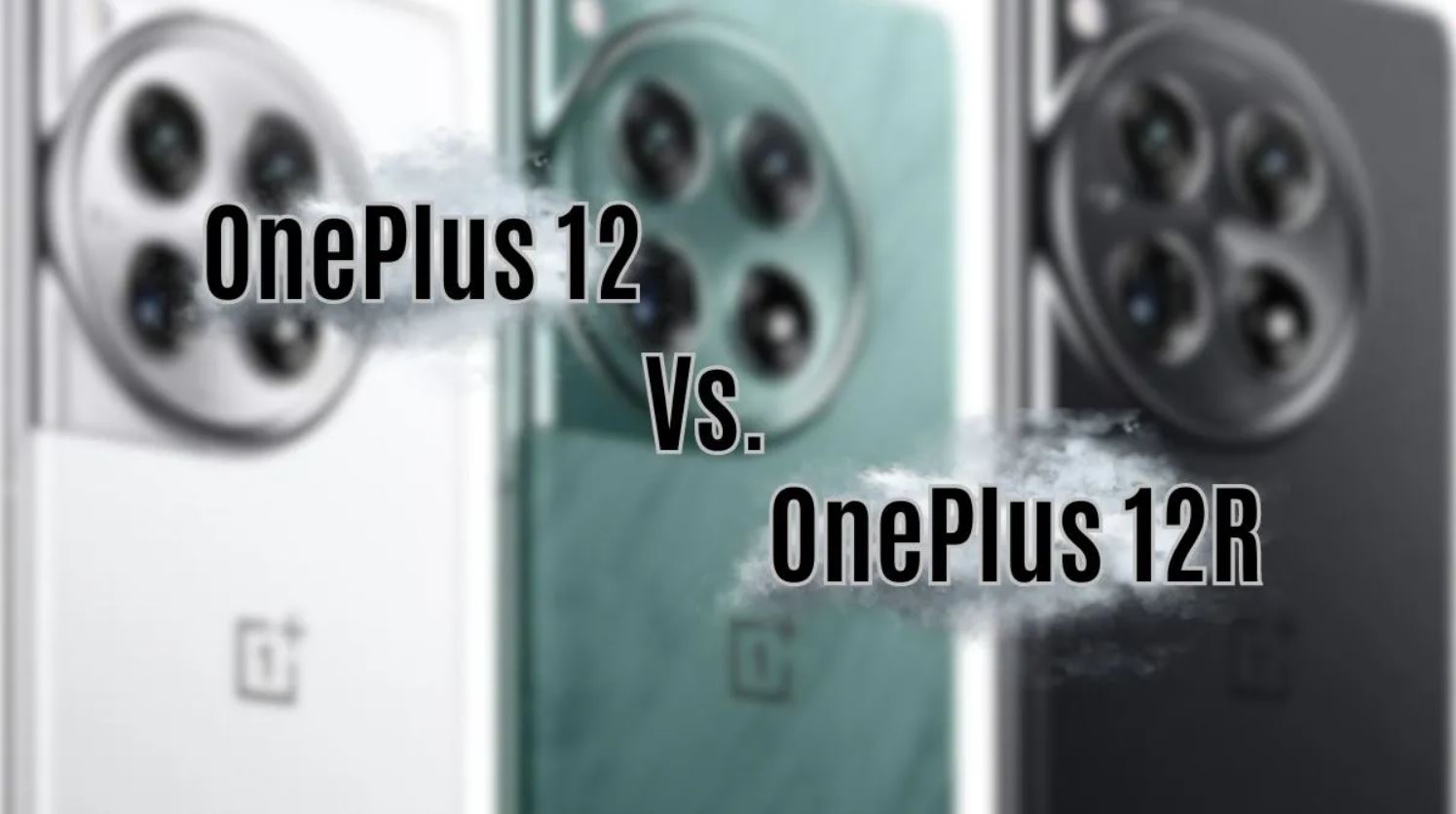Both the OnePlus 12 and the OnePlus 12R are part of the OnePlus 12 line, which came out this week in India. The series has some new changes and improvements, such as a bigger battery, a much brighter screen, a new VC cooling chamber, and more. In this review, we will be comparing OnePlus 12 vs 12r! Firstly we will go thru specifications of both in tabular form and after that we will also be discussing highlighted differences between both!
Specifications Comparison of OnePlus 12 vs 12r
Network
Launch Status
| LAUNCH | Announced | 2024, January 23 | 2023, December 05 | |
|---|---|---|---|---|
| Status | Coming soon. Exp. release 2024, February 06 | Available. Released 2023, December 11 |
Body Design Comparison
| BODY | Dimensions | 163.3 x 75.3 x 8.8 mm (6.43 x 2.96 x 0.35 in) | 164.3 x 75.8 x 9.2 mm (6.47 x 2.98 x 0.36 in) | |
|---|---|---|---|---|
| Weight | 207 g (7.30 oz) | 220 g (7.76 oz) | ||
| Build | Glass front (Gorilla Glass Victus 2), aluminum frame | Glass front (Gorilla Glass Victus 2), glass back (Gorilla Glass), aluminum frame | ||
| SIM | Dual SIM (Nano-SIM, dual stand-by) | Single SIM (Nano-SIM) or Dual SIM (2x Nano-SIM, eSIM, dual stand-by) or Dual SIM (2x Nano-SIM, dual stand-by) | ||
| IP65, waterproof and dustproof | IP65, waterproof and dustproof |
Display
| DISPLAY | Type | LTPO4 AMOLED, 1B colors, 120Hz, HDR10+, Dolby Vision, 1600 nits (HBM), 4500 nits (peak) | LTPO AMOLED, 1B colors, 120Hz, Dolby Vision, HDR10+, 600 nits (typ), 1600 nits (HBM), 4500 nits (peak) | |
|---|---|---|---|---|
| Size | 6.78 inches, 111.7 cm2 (~90.9% screen-to-body ratio) | 6.82 inches, 113.0 cm2 (~90.8% screen-to-body ratio) | ||
| Resolution | 1264 x 2780 pixels (~450 ppi density) | 1440 x 3168 pixels (~510 ppi density) | ||
| Protection | Corning Gorilla Glass Victus 2 | Corning Gorilla Glass Victus 2 | ||
| Always-on display |
Platform
| PLATFORM | OS | Android 14, OxygenOS 14 | Android 14, OxygenOS 14 (International), ColorOS 14 (China) | |
|---|---|---|---|---|
| Chipset | Qualcomm SM8550-AB Snapdragon 8 Gen 2 (4 nm) | Qualcomm SM8650-AB Snapdragon 8 Gen 3 (4 nm) | ||
| CPU | Octa-core (1×3.2 GHz Cortex-X3 & 2×2.8 GHz Cortex-A715 & 2×2.8 GHz Cortex-A710 & 3×2.0 GHz Cortex-A510) | Octa-core (1×3.3 GHz Cortex-X4 & 5×3.2 GHz Cortex-A720 & 2×2.3 GHz Cortex-A520) | ||
| GPU | Adreno 740 | Adreno 750 |
Memory
| MEMORY | Card slot | No | No | |
|---|---|---|---|---|
| Internal | 128GB 8GB RAM, 256GB 16GB RAM | 256GB 12GB RAM, 512GB 16GB RAM, 1TB 16GB RAM, 1TB 24GB RAM | ||
| UFS 4.0 – 256 GB UFS 3.1 – 128 GB | UFS 4.0 |
Main Camera
| MAIN CAMERA | Modules | 50 MP, f/1.8, 24mm (wide), 1/1.56″, 1.0µm, PDAF, Laser AF, OIS 8 MP, f/2.2, 16mm, 112˚ (ultrawide), 1/4.0″, 1.12µm 2 MP, f/2.4, (macro) | 50 MP, f/1.6, 23mm (wide), 1/1.43″, 1.12µm, multi-directional PDAF, OIS 64 MP, f/2.6, 70mm (periscope telephoto), 1/2.0″, 0.7µm, PDAF, OIS, 3x optical zoom 48 MP, f/2.2, 14mm, 114˚ (ultrawide), 1/2.0″, 0.8µm, PDAF | |
|---|---|---|---|---|
| Features | LED flash, HDR, panorama | Hasselblad Color Calibration, Dual-LED flash, HDR, panorama | ||
| Video | 4K@30/60fps, 1080p@30/60/120/240fps, gyro-EIS, OIS | 8K@24fps, 4K@30/60fps, 1080p@30/60/240/480fps, Auto HDR, gyro-EIS, Dolby Vision |
Selfie Camera
| SELFIE CAMERA | Modules | 16 MP, f/2.4, 26mm (wide), 1/3″, 1.0µm | 32 MP, f/2.4, 21mm (wide), 1/2.74″, 0.8µm | |
|---|---|---|---|---|
| Features | HDR, panorama | Auto-HDR, panorama | ||
| Video | 1080p@30fps, gyro-EIS | 4K@30fps, 1080p@30fps, gyro-EIS |
Sound
| SOUND | Loudspeaker | Yes, with stereo speakers | Yes, with stereo speakers | |
|---|---|---|---|---|
| 3.5mm jack | No | No | ||
| 24-bit/192kHz Hi-Res audio |
Comms
| COMMS | WLAN | Wi-Fi 802.11 a/b/g/n/ac/6/7, dual-band | Wi-Fi 802.11 a/b/g/n/ac/6e/7, tri-band, Wi-Fi Direct | |
|---|---|---|---|---|
| Bluetooth | 5.3, A2DP, LE, aptX HD | 5.4, A2DP, LE, aptX HD, LHDC | ||
| Positioning | GPS, GALILEO, GLONASS, BDS, QZSS | GPS (L1+L5), GLONASS (G1), BDS (B1I+B1c+B2a), GALILEO (E1+E5a), QZSS (L1+L5), NavIC | ||
| NFC | Yes | Yes, eSE, HCE | ||
| Infrared port | Yes | Yes | ||
| Radio | No | No | ||
| USB | USB Type-C 2.0 | USB Type-C 3.2, OTG |
Features
| FEATURES | Sensors | Fingerprint (under display, optical), accelerometer, gyro, proximity, compass, color spectrum | Fingerprint (under display, optical), accelerometer, gyro, proximity, compass, color spectrum |
|---|
Battery
| BATTERY | Type | 5500 mAh, non-removable | Li-Po 5400 mAh, non-removable | |
|---|---|---|---|---|
| Charging | 100W wired, 1-100% in 26 min (advertised) | 100W wired, PD, QC, 1-100% in 26 min (International) 80W wired, PD, QC, 1-100% in 30 min (USA) 50W wireless, 1-100% in 55 min (advertised) 10W reverse wireless | ||
| Stand-by | ||||
| Talk time |
OnePlus 12R vs OnePlus 12: price in India
| OnePlus 12r | OnePlus 12 |
|---|---|
| 8 GB RAM+128 GB Storage: Rs 39,999(Expected) | 12 GB RAM+256 GB Storage: Rs 64,999 |
| 16 GB RAM + 256 GB Storage: Rs 45,999(Expected) | 16 GB RAM+512 GB Storage: Rs 69,999 |
Highlighted Differences – OnePlus 12 vs 12r
Till now we have seen specifications of both the devices of same series in detail. Now, we will be discussing highlighted differences between both. To give you an overview, main difference lies between their processor(of course) and other lies in display, performance and software. Let us start with display first!
OnePlus 12R vs OnePlus 12: Display
The OnePlus 12 has a bigger and higher-resolution screen than the OnePlus 12R, which makes the viewing experience better. That being said, the 12R’s screen is amazing on its own, with its high brightness and clear AMOLED panel.
Camera
One area where the two smartphones are very different is how the cameras are set up. One of the cameras on the OnePlus 12R is a 50MP Sony IMX890 main camera. It has an 8MP ultra-wide lens and a 2MP closeup lens. The phone has a 16 MP camera for taking selfies on the front.
The cameras on the OnePlus 12 are better than before. It has a 50MP Sony LYT-808 main camera with OIS, a 64MP OmniVision 64B periscope lens with 3x high zoom and 6x in-sensor zoom, and a 48MP ultra-wide camera. On the front, there is a 32MP camera for taking selfies.
Upgrades: The OnePlus 12 has a better camera setup on the back than the OnePlus 12R. Refer to the above table for direct comparison
Performance
As the brand’s top-of-the-line phone, the OnePlus 12 has the newest Qualcomm Snapdragon 8 Gen 3 SoC, along with up to 16GB of LPDDR5X RAM and 512GB of UFS 4.0 storage. OnePlus 12R, on the other hand, has up to 16GB of LPDDR5X RAM and 256GB of UFS 4.0 storage. It comes with the Snapdragon 8 Gen 2 SoC. The Snapdragon 8 Gen 3 is faster and uses less power than its predecessor, the Snapdragon 8 Gen 2. It’s interesting that both smartphones have a new Trinity Engine that makes them work even better.
Because of six technologies, the engine can do this: HyperBoost, HyperRendering, HyperTouch, and CPU Vitalization. In simple terms, it lets smartphones keep up their great performance while using little battery. It also lets apps run longer in the background, extends the life of the phone, and improves games performance in many ways, such as by adding more frames, lowering lag, and reducing accidental touches. OxygenOS 14.0, which is built on Android 14, runs on both phones right out of the box.
New Features: The OnePlus 12 has better speed than the OnePlus 12R because it has the Snapdragon 8 Gen 3 SoC. In any case, the 12R delivers impressive performance for the price.
Battery
The OnePlus 12R has a 5,500mAh battery, which is the biggest battery that has ever been in a OnePlus phone. It also supports 100W SUPERVOOC charge. That being said, the OnePlus 12 has a 5,400mAh battery and supports both 100W SUPERVOOC direct charging and 50W AIRVOOC fast charging. The OnePlus 12 has a great battery life, and the OnePlus 12R should have an even better battery life thanks to its higher rating. According to our study, the OnePlus 12 charged to 100% in about 35 minutes. The OnePlus 12R should take about the same amount of time to charge from 0% to 100%.
These are the alterations: the OnePlus 12 has 100W fast charging and 50W wireless charging, while the OnePlus 12R does not. The OnePlus 12R has a better battery and a faster charge speed of 100W, which more than makes up for the fact that it doesn’t have wireless charging.
Verdict
Both the phone are of same series and offer many similar specifications. While one offers flagship level specifications other tried to bring flagship level experience at reduced cost. Also, looking at the previous trends of OnePlus, they have kept the price range somewhat same. Now the main comparison lies with other phones in same price range. Let us take the example of iqoo 12 which is offering Snapdragon 8 gen 3 at 52000 INR. Considering that, if OnePlus’ motive is to capture mid-range phone market it should consider optimization in the price range. But, with the release of OnePlus 12r prices of previous generations will go down. Still, OnePlus has done a commendable job in this new series.

